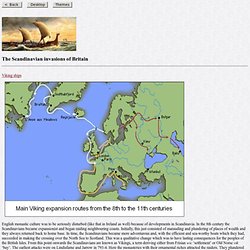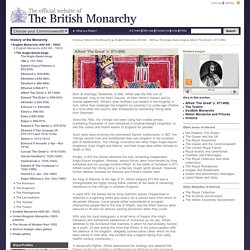

Heritage History presents Historical Tales - English by Charles Morris. Heritage History presents The Story of England by S. B. Harding. Heritage History presents Famous Men of the Middle Ages by John Haaren. Www.royal.gov.uk/pdf/alfred.pdf. Heritage History presents Stories of the Vikings by Mary Macgregor. Heritage History: Viking Invasion of Britain. History - Alfred the Great. Scandinavian invasions of Britain. Viking ships English monastic culture was to be seriously disturbed (like that in Ireland as well) because of developments in Scandinavia.

In the 8th century the Scandinavians became expansionist and began raiding neighbouring coasts. Initially, this just consisted of marauding and plundering of places of wealth and they always returned back to home base. In time, the Scandinavians became more adventurous and, with the efficient and sea-worthy boats which they had, succeeded in making the crossing over the North Sea to Scotland. This was a qualitative change which was to have lasting consequences for the peoples of the British Isles. The early Viking raids were carried out by Norwegians. Military resistance to the Danes is personified by King Alfred the Great. The influence of Scandinavian in Britain and Ireland can be seen by examining placenames which are of Viking origin. Reconstructed Viking long ship on the River Liffey, Dublin. Alfred (king of Wessex.
Alfred, also spelled Aelfred, byname Alfred The Great (born 849—died 899), king of Wessex (871–899), a Saxon kingdom in southwestern England.

He prevented England from falling to the Danes and promoted learning and literacy. Compilation of the Anglo-Saxon Chronicle began during his reign, c. 890. When he was born, it must have seemed unlikely that Alfred would become king, since he had four older brothers; he said that he never desired royal power. Perhaps a scholar’s life would have contented him. His mother early aroused his interest in English poetry, and from his boyhood he also hankered after Latin learning, possibly stimulated by visits to Rome in 853 and 855. He probably received the education in military arts normal for a young man of rank. RBH Biography: King Alfred the Great (849-899) King Alfred the Great (849-899) Born: AD 849 at Wantage, Berkshire King of England Died: 26th October AD 899 at Winchester, Hampshire Alfred was the youngest son of King Aethelwulf and his wife, Osberga.

He was born at the Royal Palace of Wantage (Berkshire) in AD 849. He was brought up and educated by his mother and a famous story tells how she once promised an expensive illuminated book to the first of her children to learn to read it. Despite his young age, Alfred won the prize and he continued to understand the importance of knowledge throughout his later reign as King.
When his brother, Aethelred, became King of Wessex in AD 865, Alfred was sixteen. Alfred was now King of Wessex, but he was still unable to stop the Viking menace. Once again, however, peace was short-lived. From a temporary fort constructed at Athelney, Alfred rallied his remaining troops. The moral and religious well-being of his people was as important to King Alfred as their physical protection. English Monarchs - Kings and Queens of England - Alfred the Great. No other ruler in England's long and varied history has been honoured with the title the Great.

Alfred once declared it his intention "To live worthily as long as I live and after my life to leave to them that should come after, my memory in good works. " Few of our monarchs have succeeded as spectacularly in their aims as he did. Early Life. The Anglo-Saxon kings > Alfred 'The Great' Alfred 'The Great' (r. 871-899) Born at Wantage, Berkshire, in 849, Alfred was the fifth son of Aethelwulf, king of the West Saxons.

At their father's behest and by mutual agreement, Alfred's elder brothers succeeded to the kingship in turn, rather than endanger the kingdom by passing it to under-age children at a time when the country was threatened by worsening Viking raids from Denmark. Since the 790s, the Vikings had been using fast mobile armies, numbering thousands of men embarked in shallow-draught longships, to raid the coasts and inland waters of England for plunder. Such raids were evolving into permanent Danish settlements; in 867, the Vikings seized York and established their own kingdom in the southern part of Northumbria.
The Vikings overcame two other major Anglo-Saxon kingdoms, East Anglia and Mercia, and their kings were either tortured to death or fled. Second, Alfred started a building programme of well-defended settlements across southern England.